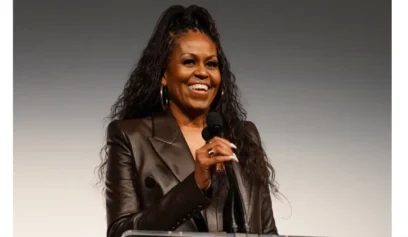Demonstrating how difficult a time President Obama has had convincing even his staunchest supporters of the need for a military strike against Syria, the president admitted that even the first lady Michelle Obama is against military intervention.
President Obama told PBS, “My own family members…they’re very wary and suspicious,” saying the first lady does not want the country to engage in another war:
“If you ask Michelle, ‘Do we—do we want to be involved in another war?’ The answer is no,” Obama said to NBC.
Of course, much of this debate could be rendered moot after Syria indicated recently it might be willing to turn over its entire arsenal to the United Nations, which is now working on a proposal.
In addition to his wife, Obama is also having a difficult time convincing the 43 members of the Congressional Black Caucus of the need for a Syrian strike, even after a nearly two-hour meeting in the White House. Most of the members filed out after the meeting saying they were still undecided. The CBC is the only rank-and-file group that has been brought to the White House for a one-on-one with the president.
Rep. Jim Clyburn, the third-highest ranking Democrat in the House, said the president argued his position well.
“He made a good case for his issue,” Clyburn told POLITICO. “There is nothing missing — it’s all about the politics of it, for me anyway.”
“It helped me tremendously in answering some of the questions I have in making a decision,” Rep. G.K. Butterfield (D-N.C.) told POLITICO. “I’m still in the undecided category. I would like to get all the facts before I make a final decision. It’s probably going to be one of the most difficult decisions I made.”
Butterfield said the opposition from constituents is making the decision harder.
“I don’t think the president was trying to sell it as much as he was trying to explain it,” Butterfield said. “He gave us a very basic interpretation of what is happening in Syria and it’s not a good picture.”
“The evidence is overwhelming — it appears that Assad has used chemical weapons against innocent civilians and that’s unacceptable,”Butterfield said. “There has to be a response. The question is what is the appropriate response? Is it go in and strike his delivery system? The president made that clear — we’re not taking out his chemicals, we would be unable to do that. We would be taking out his delivery system for chemical warfare and that was very helpful.”
“This is a very difficult decision for everyone but that doesn’t mean the meeting wasn’t a productive one,” Rep. Elijah Cummings (D-Md.), the ranking member of the House Oversight Committee, said. “I think it was extremely helpful. I thought the president was very frank with us and I’m glad he did it.”
One of Obama’s strongest allies, MoveOn.org, has even gone on a campaign against the president’s plan, launching a stay-out-of-Syria salvo, complete with a television ad that urges members of Congress to vote no on the administration’s call for military action.
“Our members do not relish opposing the president,” MoveOn.org Executive Director Anna Galland told NPR. “They worked their hearts out for him — including an early endorsement in 2008.”
“It’s with sadness, respect and resolve that we are saying no to military action,” she says.


